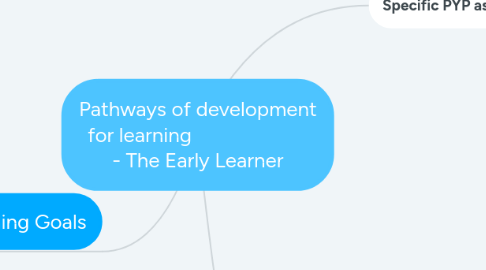
1. Learning Goals
1.1. To know different ways of supporting symbolic exploration and expression • To understand the role of play in the PYP framework • To understand the importance of building relationships with students and their families • To understand the relationship between spaces and learning
2. Specific PYP aspects supported
2.1. Collaboration
2.1.1. facilitating collaboration through providing adequate spaces for students to work together in groups of varying sizes and for different purposes
2.2. Play Based Inquiry
2.2.1. co constructing new understandings through specific play stimulus and scenarios
2.2.2. Value time - How is this structured and valued within the constraints of the programme and across the day?
2.2.3. 'Inquiry from the perspective of children’s wonder - they’re trying to make sense of their world by asking questions and seeking knowledge to understand and make meaning.'
2.2.4. Choose, act reflect - naturally occurs within this setting
2.3. Agency
2.3.1. Voice for eg within class meetings students raise problems or questions, respectful communication where all voices are valued.
2.3.2. Choice - participate in decision making process eg What are the class norms? Establish an Essential Agreement
2.3.3. Ownership - belonging to a democratic community, feeling a connection to space and the decisions made within and about that space.
2.4. Action
2.4.1. Within the play based inquiry setting, students are taking action as a result of their inquiries, this may trigger further questions to explore and thus steering the students to further inquire, developing a greater depth of investigation
2.5. Learner Profile
2.5.1. skills, attributes and dispositions explored through play
2.6. Transdisciplinarity
2.6.1. Students 'don’t separate their thinking, or compartmentalise, as they work through complex ideas or explore concepts in their play'
2.7. Teachers as facilitators
2.7.1. 'observe what is happening in their play and support what the children are doing by adding something—whether it is a question, a change in the learning space or a proposal—to challenge their thinking.'
2.8. Reflective practices
2.8.1. teachers discern, making connections with students understanding to guide teaching and learning opportunities
2.9. Assessment
2.9.1. monitoring, documenting and reporting student's individual development
2.10. Language - development through providing a variety of resources and experiences
2.10.1. development of symbolic thinking
2.10.2. different ways children may express themselves
2.10.3. students make meaning and extend their ideas through a variety of mediums
2.10.4. body language and facial expressions
3. IB Capabilities
3.1. C3 Design inquiries using local and global context
3.2. C4 Build and maintain relationships
3.2.1. Establishing safe and nurturing relationships connecting space and place ... “where are the traces of you in here from yesterday that you can reconnect with?”
3.2.1.1. Creating a sense of community, nurture peer relationships. Class meetings provide a means to come together address many topics eg daily learning, work through problems or questions
